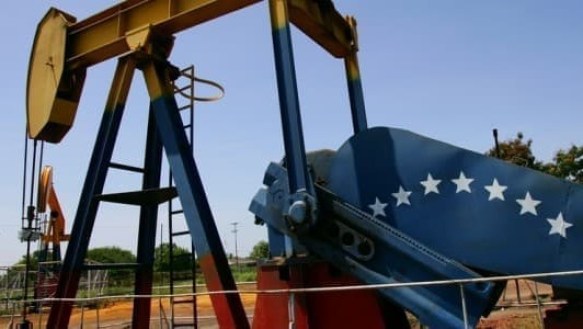
Soaring energy prices, triggered by Russia’s invasion of Ukraine and diminished global production, have brought the focus back onto Venezuela, an OPEC member who was a major petroleum exporter and holds the world’s largest oil reserves. Strict U.S. sanctions effectively cut Venezuela off from global energy and capital markets, not only accelerating the strife-torn country’s economic and humanitarian crises but impacting global crude oil supplies.
By OilPrice – Matthew Smith
May 26, 2022
The near-failed state is seen by oil industry insiders and analysts as a solution for ever tighter global petroleum supplies, despite Venezuela’s petroleum output collapsing to less than 2 million barrels daily since 2017. North American crude oil supply shortages were magnified by President Joe Biden’s decision to ban Russian oil imports as part of Washington’s comprehensive response to the Kremlin’s decision to invade Ukraine. That ban, which was approved by Congress in April 2022, according to U.S. Energy Information Administration data removed around 200,000 barrels per day of crude oil from U.S. energy supplies.
The surge in oil prices is a key driver of soaring U.S. inflation, which hit a 41-year high of 8.5% for March 2022, posing a significant risk to the post-pandemic economic recovery. The impact of higher inflation became obvious when U.S. first quarter 2022 gross domestic product data was released with GDP for the period unexpectedly contracting by 1.4%, fueling further fears of a looming recession. It is soaring global oil prices which are a key driver of the recent inflationary surge with the international Brent benchmark price rising by a stunning 68.5% over the last year. That, aside from the war in Ukraine, can be attributed to a lack of oil industry investment and drilling activity after the August 2014 oil price collapse, which worsened with the March 2020 Russia Saudi Arabia price war and the COVID-19 pandemic. Global oil supplies will remain constrained for some time to come, meaning that sharply higher petroleum prices are here to stay, at least for the immediate future. Even members of the OPEC Plus cartel, which is comprised of six of the world’s top-10 oil producing countries, are struggling to boost production to agreed quotas.
Soaring oil prices are hitting U.S. consumers hard at the pump. According to the EIA U.S. gasoline prices recently hit a record high of $4.59 per gallon. That along with spiraling prices for other goods and services is placing considerable pressure on the Biden administration and the U.S. post-pandemic economic recovery. As a result, Biden announced he will make fighting inflation a priority. The key to reducing inflation will be bringing down domestic fuel prices by expanding U.S. crude oil supplies. In early March 2022, the Biden Whitehouse sent an official mission to Venezuela with the goal of initiating a dialogue with the pariah Maduro regime. This was the first such engagement with the autocratic government in Caracas since the U.S. Embassy exited Venezuela in January 2019, relocating to neighboring Colombia. It was viewed by many as a cynical attempt to secure additional crude oil supplies from Caracas in exchange for Washington easing strict U.S. sanctions that have sharply impacted the Venezuelan state.
The Whitehouse denied this, claiming that the diplomatic mission was intended to blunt Russia’s influence in Venezuela as part of a broader strategy of containing the Kremlin in Latin América after President Vladimir Putin’s invasion of Ukraine. Washington is of the view that the Kremlin’s allies in Latin America, Venezuela, Cuba and Nicaragua, could become serious security threats if the stand-off with Russia worsens. The Biden Whitehouse claimed that the mission was related to ensuring that dialogue with the Maduro regime remained open and securing the release of U.S. citizens detained unlawfully in Venezuela, namely the CITGO-6. The March 2022 envoy was able to secure the release of one of the CITGO-6, Gustavo Cardenas, and another American, Jorge Fernández, who had been detained over unrelated matters.
In a recent statement, the Biden administration said it will start easing some sanctions against Venezuela to build a positive relationship with Maduro’s Venezuela. According to Whitehouse officials, the first step will be to allow global energy supermajor Chevron, the only U.S. oil company still operating in Venezuela, to negotiate its agreements with Venezuelan national oil company PDVSA. That change in requirements does not allow Chevron to enter into agreements with PDVSA, meaning the oil supermajor is only able to initiate discussions and talk with the Venezuelan government-run oil company. Restrictions that prevent Chevron from producing and exporting Venezuelan petroleum will remain in place.
Whether that minor change will bring any meaningful change to the situation in Venezuela, notably the deep-seated economic and humanitarian crisis engulfing the OPEC member, is questionable. Chevron’s stance on its Venezuelan operations currently remains unchanged. Ray Fohr, the energy supermajor’s external affairs advisor for South America stated:
“We continue to conduct our business in compliance with the current License framework provided by the U.S. Office of Foreign Assets Control (OFAC). We are a constructive presence in Venezuela, where we have investments and a large workforce who are dependent on our presence. We remain committed to the safety and wellbeing of our employees and their families, the integrity of our joint venture assets, and the company’s social and humanitarian programs during these challenging times.”
…
Read More: OilPrice – Could lifting sanctions on Venezuela help ease the energy crunch?
…

